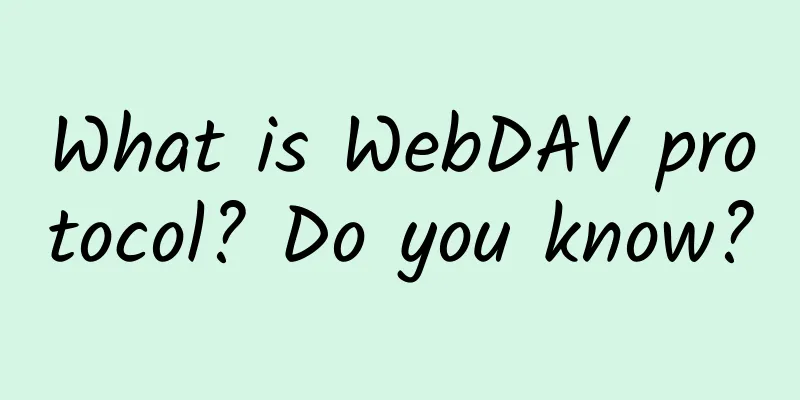F5 President Fan Zhonglin reveals the story behind the acquisition of Nginx. What will F5 do after the perfect complement?

|
[51CTO.com original article] On March 11, 2019, F5 Networks announced that it would complete the acquisition of Nginx for $670 million before the second quarter of this year. As soon as this news came out, it triggered a wave of discussion in the domestic open source community, and the enthusiasm was comparable to that of a raging fire. Some developers questioned that this acquisition was quite similar to Oracle's acquisition of MySQL, and expressed concerns about the future development of the Nginx brand. Some developers also believed that this was a strong combination, and that in the future, no one would be able to surpass it in the application delivery field. On May 20, F5 President and CEO François Locoh-Donou (Chinese name: Fan Zhonglin) "airdropped" to Beijing and accepted an exclusive interview with 51CTO reporters. In just one hour of interview, he not only revealed the many considerations before and after F5's acquisition of Nginx, but also clearly answered some questions from domestic open source community developers. At the end of the interview, he also shared F5's future plans and vision in China, which can be said to be a "360° no-dead-angle" analysis of F5's present and future.
F5 and Nginx product lines are highly complementary, 3 reasons contributed to the acquisition François told reporters that the acquisition of Nginx is progressing smoothly. He first denied the competitive relationship between the two. In his opinion, the product lines of F5 and Nginx complement each other. First of all, from the perspective of the currently formed product lines, Nginx currently has three major product lines, namely network servers, application servers, and API interface gateways, all of which F5 does not have; secondly, from the perspective of products under development, Nginx is developing a software load balancing controller, while F5 is developing a cloud native server. The two do have an overlapping relationship, but after F5 decided to acquire it, it will integrate all the resources of both parties to jointly develop a unified controller and launch it to the market under the Nginx brand in the future. François repeatedly emphasized that Nginx will still be an independently operated business unit in F5. Talking about the original intention of the acquisition, he believes that a large part of the reason is based on the consideration of F5's customer needs. As we all know, F5 mainly provides application delivery services for mission-critical applications for large data centers. Its strength lies in application management NetOps, while Nginx's advantage lies in DevOps, facing the next-generation operating environment, such as microservices and containers. Before, the two seemed to be parallel worlds with no intersection, but as more and more F5 customers move to multi-cloud environments, they require that enterprise applications can be smoothly managed in both worlds. Therefore, F5 believes that it has the responsibility to build a bridge, combining the two environments to provide unified services and ensure the security of applications. "This is an indispensable part of F5's multi-cloud application vision. After the acquisition, F5 has extended its tentacles into the DevOps environment through Nginx, and has a deeper understanding of the needs of the DevOps environment, and ultimately provides enterprise customers with a single management point to promote the development of multi-cloud environments. Customers can also enhance their application delivery capabilities through Nginx products, making them more confident in the development of the next generation." In addition to this reason, François admitted that open source innovation has extremely strong vitality. Many technologies launched by Nginx, such as Web server, Load balancing, and App server, are subverting traditional fields and creating new markets. F5 attaches great importance to the open source community, and also cherishes and loves the innovative open source business model of Nginx. Therefore, developers in the open source community in China do not have to worry. F5 will definitely support the business model of the open source community in the future. Not only that, F5 will also invest more resources to support the development of open source projects, while supporting the development of Nginx's own technology. "In the future, developers in the Chinese open source community and the global open source community will definitely see an Nginx that is accelerated and provides more solutions, whether it is an open source project or a paid version project." Of course, we have to admit that Nginx's software advantages are also very attractive to F5. Today, customers are very willing to consume technology products in the form of software. F5's internal software department has grown rapidly in the past three years, with software growth exceeding 30% in the last quarter. Therefore, Nginx, as a pure software provider, not only greatly enriches F5's software product categories, but also conforms to F5's development strategy and can accelerate the improvement of F5's software capabilities. Nginx customers will also benefit from this and have higher satisfaction It is conceivable that F5's customers will be happy about this acquisition. Will Nginx's customers be happy about it as well? François gave a very positive answer. He told reporters that Nginx is an innovative company with a small scale and limited financial resources. After the acquisition, F5 will provide Nginx with more financial support, allowing it to realize its development roadmap more quickly. François also cited two examples. First, after the acquisition, the number of Nginx engineers doubled, which can better serve customers and deliver higher-quality products. Second, when Nginx's original customers have demand for F5 products, deployment will be easier. For example, when Nginx customers need to deploy a network application firewall, since F5's WAF product is the best choice in the market, F5 can embed the WAF function into the Nginx solution, and Nginx customers can directly benefit from it. "I have every confidence that Nginx customers will benefit from this acquisition and will be more satisfied." François also added that, as mentioned above, the two parties jointly developed a cloud native controller, and F5 developed many special features in this controller that Nginx does not have. After the product integration, the controller capabilities of Nginx have been greatly improved. Nginx customers can therefore enjoy more enterprise-level, very rich features. Deeply cultivating the Chinese market, F5 advises customers to enhance agility to win in the digital era After talking about the acquisition event that the developer community is most concerned about, François also began to talk about the reasons and arrangements for his visit to China. He said that F5's team in China is growing day by day, and he believes that it is very necessary to come to China to communicate in depth with the F5 team, partners, and customers. In fact, what François said is indeed not a compliment. As early as when he just joined F5, he made the decision to go deep into the Chinese market. More than a year ago, F5 and Digital China established a local brand, Shenma Cloud Technology, to meet the needs of domestic customers in the local market. F5 has also established a service center in China to better meet customer needs, such as helping customers build private clouds. Not only that, F5 is also actively integrating with domestic public cloud service providers to provide a more unified application delivery solution. When asked if he could give some advice on multi-cloud environment deployment to large Chinese industry customers, he said that in fact, when facing customers, he listens more and understands their ideas and needs. Of course, F5 has more than 25,000 customers worldwide, distributed in different vertical industries such as finance, manufacturing, retail, government affairs, and medical care. F5 does have some insights that can be shared with customers in need. "In a multi-cloud environment, I think the most important advice is to allow customers to be agile enough when making business decisions." François explained that today's market competition is very fierce, and a large part of winning the competition depends on whether one can respond quickly to market changes. The agility of the business department is inseparable from the support of the agility of the back-end IT department. So what elements does the agility of the IT department include? Francois summarized three points: first, a full understanding of enterprise resources, second, the best choice of technology including cloud, automation, scheduling, and applications, and third, full insight into application assets such as health status, security status, and distribution status. "If these three points can be achieved, the enterprise will have strong agility, and in the digital age, it will have a real competitive advantage." During the interview, the reporter asked François a personal question: Since he joined F5, a large company with a long history and market position in 2017, what has been the greatest pressure and the happiest thing? François told the reporter very frankly that he was under the greatest pressure during the initial period when he joined F5. "F5 has too many excellent employees. Everyone has made great efforts to build F5 into a company with a revenue of 2 billion US dollars. What should I do to win the recognition and respect of these employees? How can I gain others' utmost support and make F5 better together?" What made him happy was that he soon discovered that F5 employees had a very high degree of acceptance and execution of changes. More and more professional high-end talents have gradually joined the F5 team, which made him very pleased. "Of course, there is also the acquisition of Nginx. During the acquisition process, I clearly felt that Nginx employees were full of expectations and visions for the future. Their excitement also influenced me and made me feel the same way." Throughout the interview, François was frank and the reporter could clearly feel his sincerity. I have to admit that the head of F5 is indeed a very charismatic leader, with clear logic and to the point. He has a long-term plan for the future development of F5 and is confident, which convinces the reporter. Many people may not know that F5 is also a leading security solution provider in the global market. Unlike Chinese customers who equate F5 with load balancing, the US and European markets have a high degree of recognition for F5 security solutions, especially WAF, SSL encryption and decryption, traffic management and other solutions. In the future, F5 will further highlight its security capabilities in China, and will launch more security products and combined solutions to the market. [51CTO original article, please indicate the original author and source as 51CTO.com when reprinting on partner sites] |
<<: After reading this article, my grandma understands the principle of HTTPS
>>: 5G needs new Wi-Fi tech to succeed, Cisco says
Recommend
Remote holographic presentation is the development direction in the 5G era, and AR/VR hardware has entered a period of quantitative change
"Holographic telepresence is expected to bec...
Serverless Engineering Practice | Quickly Build Kubeless Platform
Quickly build a Kubeless platform Introduction to...
The Haidilao obscene video incident was solved, and the WiFi security problem in public places is serious
[[255453]] The Haidilao indecent video incide...
Forcepoint releases 2017 cybersecurity predictions
[[179053]] Forcepoint , a global cybersecurity le...
In the next generation technological revolution, the Internet of Things, who will play the role of “vanguard”?
The Internet of Things (IoT) is widely regarded b...
RAKsmart: 35% off VPS from $0.99/month, data centers in Los Angeles, San Jose, Hong Kong, Japan, and South Korea
We have previously shared information on VPS host...
The Future of Wi-Fi: Prepare Your Business for the Internet of Things
Connectivity is critical to nearly every aspect o...
Clouvider: £3.15/month - 2GB/50GB/5TB@10Gbps/8 data centers available
Clouvider is a foreign hosting company founded in...
How is the VoLTE development of the three major operators?
There are always various opportunities for indust...
A roundup of the top 10 data center news stories of 2018
The public cloud has not killed the data center, ...
Talk丨Can positioning become a new growth point for LoRa technology?
First, an example: If you and your good friend ma...
From intelligent operation and maintenance to smart operation, Qingchuang Technology gives enterprises the ability to detective Sherlock
[51CTO.com original article] Operation and mainte...
TLS, SSL, CA certificate, public key, private key...let’s take a look at them today!
Song Ge has been serializing gRPC with his friend...
GigsGigsCloud: Los Angeles CN2 GIA+CUVIP line KVM quarterly payment starts from US$18
GigsGigsCloud is a Malaysian hosting company foun...
How to cut data center costs without sacrificing performance?
While organizations are placing greater demands o...









